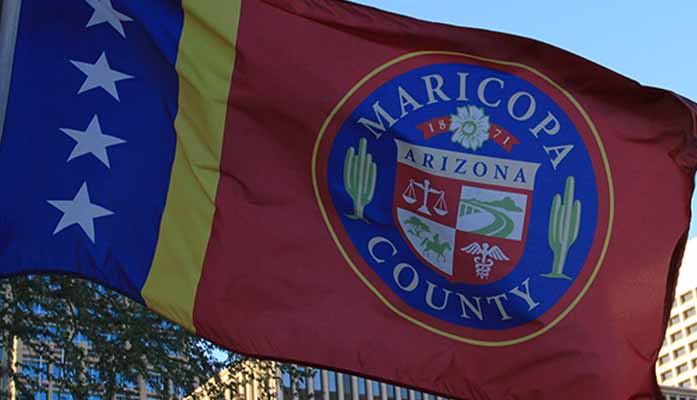
by Jonathan Eberle | Sep 26, 2025 | Economy, News
By Jonathan Eberle |
Arizona’s housing market showed signs of cooling in the second quarter of 2025, but affordability challenges persist, according to a new analysis from the Common Sense Institute (CSI).
CSI’s Q2 Housing Affordability Report highlights a combination of falling home prices, slowing residential permitting, and a continuing housing deficit as factors shaping the state’s housing outlook.
Key findings from the report indicate that Arizona currently faces a housing shortage of 52,846 units, a 6.9% decline from 2024. Analysts say the reduction stems more from weakened buyer demand than from an increase in housing supply.
The average home price in the state remains $426,164—roughly $53,400 (14.3%) above what prices would have been if they had followed pre-pandemic trends. Despite recent price declines, households still need to earn $95,808 annually—or work 64 hours per month at the average wage—to afford a mortgage on the typical home.
The CSI report assigns Arizona a “C-” grade for housing in Q2 2025, noting continued affordability concerns and low permitting levels. Maricopa County maintained its “D” rating, while Pima County improved to a “B.” Residential permitting in Arizona is projected to approve 51,877 units this year, a 12.5% decrease from 2024 and the slowest pace since 2019. Experts note that the state needs between 60,000 and 75,000 new units annually to close the housing gap.
“Arizona’s housing market is cooling, but the relief many hoped for has not materialized,” said Zachary Milne, CSI Senior Economist and Research Analyst. “Prices are still far above pre-pandemic levels, mortgage costs remain burdensome, and new homebuilding is slowing at a time when the state already faces a significant housing deficit. Without a sustained increase in supply, affordability will remain out of reach for too many Arizonans.”
The report concludes that Arizona’s long-term housing challenges are driven by both elevated prices and insufficient construction. While the recent moderation in demand has provided some short-term relief, the underlying supply gap continues to affect affordability across the state.
Jonathan Eberle is a reporter for AZ Free News. You can send him news tips using this link.

by AZ Free Enterprise Club | Sep 25, 2025 | Opinion
By the Arizona Free Enterprise Club |
Taxpayer-funded resources should not be used to tilt the scales of any election. This isn’t a difficult concept to understand. So, when Arizona State University (ASU) and PBS were exposed for colluding to help Katie Hobbs in the 2022 governor’s race against Kari Lake, we demanded accountability. We called on Arizona Attorney General Kris Mayes and Maricopa County Attorney Rachel Mitchell to launch a full investigation. After all, Arizona law is clear that universities must remain impartial and neutral in election-related activities.
In a ridiculous decision, both Mayes and Mitchell refused to take action on our complaint. But this battle is far from over.
The Illegal Use of Public Funds
This all began back in 2022 when Katie Hobbs was ducking just about everyone during her campaign for governor, most especially Kari Lake. It culminated in Hobbs’ refusal to debate Lake on Arizona PBS. From there, the process should’ve been simple. According to long-standing Arizona Citizens Clean Elections Commission (AZCCEC) rules, Kari Lake should have been provided with airtime, and the AZCCEC planned to do just that. But hours before Lake’s interview was scheduled to take place, the AZCCEC learned that Arizona PBS went behind their back to schedule an exclusive interview with Katie Hobbs—moving them to postpone Lake’s interview.
Then, last month, a series of emails came to light revealing that ASU leaders including President Michael Crow, former Arizona Republic publisher Mi-Ai Parrish, and Arizona PBS leaders allegedly colluded to jettison the debate rules to help Hobbs. This was a blatant and illegal use of taxpayer funds, and that’s why we filed a Hatch Act complaint with Mayes and Mitchell against ASU. But in a shocking and shameful decision, both decided against taking action…
>>> CONTINUE READING >>>

by Staff Reporter | Sep 25, 2025 | News
By Staff Reporter |
New campaign signs appearing in the Chandler area are claiming a ballot amendment would keep term limits — but it actually rolls them back.
The signs advocate for the passage of Proposition 410 this November with phrasing that includes “Keep Term Limits.” In reality, the passage of Proposition 410 would amend the city of Chandler’s charter to expand term limits.
Under the proposition, individuals may serve 16 consecutive years — eight years as a council member, eight years as the mayor — before triggering a four-year waiting period.
The proposition seeks to clear away confusion resulting from myriad interpretations of current term limits within the city charter, namely one interpretation which declares that the present charter’s provision for two consecutive term limits on the council applies to the council members and the mayor together.
Additionally, the proposition clarifies that individuals elected to be mayor or elected to the council would be limited to two consecutive terms with a waiting period of four years after those terms. Again, nonconsecutive terms wouldn’t trigger the four-year waiting period.
The four-year waiting period can be waived, however, by the council to fill any vacancies on the council including for the office of the mayor.
The city charter amendment on the November ballot stands to benefit at least one council member: Councilman Matt Orlando, who filed a statement of interest to run for mayor in next year’s election. Orlando is serving his second consecutive term on the council. Under the one interpretation of the current charter, Orlando would not be eligible to run for mayor in 2026.
The council introduced the proposition following challenges to the interpretation of term limits within the current language of the charter, which puts limits on a “consecutive combination” of terms served as mayor and on the council.
“No person shall be eligible to be elected to the office of councilmember for more than two consecutive terms, or to the office of mayor for more than two consecutive terms or to more than a consecutive combination of the same,” states the current charter. “A person elected to two consecutive terms as a councilmember or two consecutive terms as mayor or a combination of the same as above set forth shall not be eligible to hold either office again until four years have elapsed.”
A lawsuit over the current charter language prompted Mayor Kevin Hartke to cease his 2026 campaign for a council seat.
“The City Council desires to propose amendments to the City Charter to clarify certain ambiguities in the Charter regarding the term limits for councilmembers and mayor,” stated the resolution passed earlier this year.
Hartke faced a lawsuit from a former opponent, Ruth Jones, who ran against him in 2022. Jones contended in her lawsuit, filed in May, that the city charter’s term limits invalidated Hartke’s election in 2022. Hartke served on the city council for nine years, twice as vice mayor. Under the one interpretation mentioned above, Hartke would not have qualified to serve as mayor.
AZ Free News is your #1 source for Arizona news and politics. You can send us news tips using this link.

by Matthew Holloway | Sep 25, 2025 | News
By Matthew Holloway |
Arizona Rep. Juan Ciscomani (R-AZ06) sharply admonished Sen. Mark Kelly on social media Tuesday after the Tucson Democrat announced his Monday night appearance on The Late Show with Stephen Colbert. Some critics online are accusing Kelly of angling for a 2028 White House run while neglecting his Senate duties, echoing similar concerns about Senator Ruben Gallego’s Iowa town hall this summer.
In a post to X, Kelly wrote, “Always a privilege to be on the @ColbertLateShow! Tune in tonight on CBS to see my conversation with @StephenAtHome.”
This move followed Colbert’s trivializing of the suspension of Jimmy Kimmel by ABC after that host made offensive remarks following the assassination of Charlie Kirk, and amidst a tense congressional standoff that could lead to a government shutdown.
Sharing Sen. Kelly’s post to X, Ciscomani openly admonished him, writing, “Or, how about actually doing some *real* work, Senator? Avoiding a disastrous government shutdown is in the hands of Senate Democrats. Late-night TV interviews aren’t going to help make sure our border agents get paid, or keep the Grand Canyon open.”
He added, “This guy is AZ’s Senior Senator,” before following up with a reminder of Kelly’s duty to Arizona with a stern command: “Do. Your. Job.”
Nick Field of PoliticsPA pointed to Democrats feeling out a 2028 presidential run by “guesting” on Colbert throughout the week, writing, “Three potential 2028 Democratic candidates are guesting on Colbert this week: Mark Kelly on Tuesday, Gavin Newsom on Wednesday and Chris Murphy on Thursday.”
During the interview with Colbert, Kelly used about half of his time in the spotlight joining the host in bashing President Trump, telling Colbert he wishes that a Republican would “grow a spine and do something publicly,” about “the President and how he conducts himself.” He even attempted to lay the blame for the likely upcoming shutdown at the President’s feet.
“Let me make this perfectly clear to everybody. This is a fight over the cost of your health care,” Kelly claimed. “That’s all this is about. The president says no. He says he would prefer a government shutdown.”
The conversation with Colbert quickly turned to the assassination of Charlie Kirk, framed in Sen. Kelly’s experiences surrounding the attempted assassination of his wife, former Democrat Rep. Gabrielle Giffords, in 2011.
Matthew Holloway is a senior reporter for AZ Free News. Follow him on X for his latest stories, or email tips to Matthew@azfreenews.com.

by Jonathan Eberle | Sep 25, 2025 | Economy, News
By Jonathan Eberle |
Maricopa County has retained the highest possible credit rating. Standard & Poor’s Global Ratings affirmed its AAA rating with a stable outlook, signaling strong financial health amid broader economic challenges.
County officials say the rating reflects careful fiscal management and a solid economic foundation. According to Chairman of the Board of Supervisors Thomas Galvin, District 2, the AAA rating demonstrates that “Maricopa County is not only financially strong but fiscally responsible.”
The County operates well below its maximum property tax levy and carries no general obligation debt, a distinction rare for large counties. Officials note that these measures help reduce costs for residents while supporting strategic investments in infrastructure and public services.
The AAA rating reflects several factors, including:
- Conservative budgeting and prudent financial management.
- Healthy reserves that protect against economic uncertainty.
- A diverse local economy, with strong employment in government, education, health care, and aerospace.
- Taxpayer protection through levying nearly $270 million below the County’s maximum property tax capacity.
- Absence of general obligation debt, limiting taxpayer liabilities.
Maintaining the AAA rating also allows the County to borrow at lower interest rates, which can save millions of dollars on capital projects such as public safety facilities, technology upgrades, and infrastructure improvements. Officials say these savings benefit residents through enhanced services and lower costs.
The affirmation comes at a time when many counties nationwide face economic pressures, highlighting Maricopa County’s continued focus on long-term fiscal stability.
Jonathan Eberle is a reporter for AZ Free News. You can send him news tips using this link.





